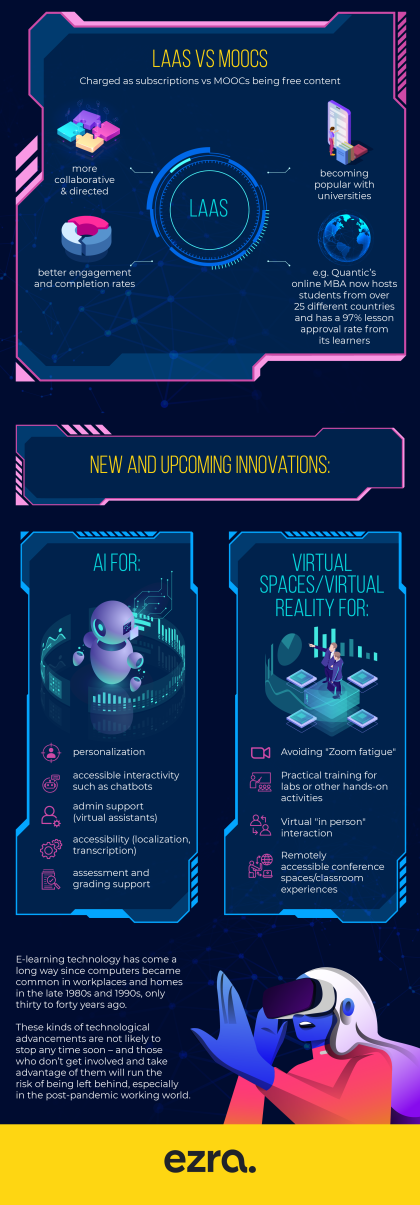The Past & Future of Learning Technology

EZRA looks at the past history and future potential of learning technology, from the first teaching machines of the 1920s through to the development of online and e-learning, and the potential future innovations in the fields of MOOCs and apps.
The technological world has advanced at a rapid rate over the past few decades, and doesn’t look to be slowing down any time soon. E-learning is just one of the many areas that can and does benefit from this, and the future is looking even more exciting.
The timeline of e-learning solutions starts as far back as 1924 with the first “automatic teacher,” followed in 1954 with the first “teaching machine.” 1960 saw the world’s first computer-based training, and the Open University opened its CICERO learning system in 1976. By 1986, 25% of all US schools were using PCs for college and career guidance for students.
Internet use became widespread in 1995 and it was Google’s then-CEO Eric Schmidt who is generally credited with the takeoff of the term “cloud computing” after he introduced the concept at an industry conference. Just two years later in 2008 the first Massive Open Online Courses, or MOOCs, became available on Wikiversity, and by 2014 the idea of e-learning on mobile took off big time as apps began to shift rapidly away from merely being games or social media platforms towards more integrated “lifestyle support” and “service layers.”
MOOCs have continued to rise. The first, original MOOCs had 40 partner universities and offered around 250 courses, while today’s equivalents have 950 partner universities and over 16000 courses available. An enormous 58,000 students enrolled in the first online course at Stanford University in its first month, and 80000 Google employees enrolled on Udacity’s HTML5 course. In fact e-learning solutions as a road to workplaces are becoming a huge deal; there are now over 350 major companies who pay Udacity and Coursera to identify the best students on relevant courses so that they can consider them as top employment candidates.
LAAS (learning as a service) programs are slightly different to MOOCs; they tend to run as paid subscriptions (where MOOCs are free), are often more collaborative and directed, tend to have better engagement and completion rates (perhaps because of the required investment), and are becoming increasingly popular with universities. Quantic’s online MBA, for example, now hosts students from over 25 different countries and has an impressive 97% lesson approval rate from its learners.
So what are the new and upcoming innovations for learning technology?
AI is increasingly being touted as a new solution to help with personalization and accessible interactivity, through mechanisms such as chatbots. AI also offers benefits to learning admin support, in the form of virtual assistants who can help with anything from calendar management to assessment and grading support, and is also a huge benefit to learning accessibility as machine learning technology helps speed up localization and transcription.
Virtual reality (or “virtual spaces”) are also on the rise. They’re popular for avoiding so-called “Zoom fatigue” from endless video calls as they offer truly virtual interaction “in person” rather than via a screen. VR also adds the ability to undertake remote practical training for hands-on or laboratory-type activities, as well as giving access to virtual classroom experiences or conference-type spaces which are more engaging than mass video calls.
E-learning technology has come a long way since computers became common in workplaces and homes in the late 1980s and 1990s, only thirty to forty years ago. These kinds of technological advancements are not likely to stop any time soon – and those who don’t get involved and take advantage of them will run the risk of being left behind, especially in the post-pandemic working world.


EZRA has redesigned leadership coaching for the digital age to transform your company’s workforce through affordable, scalable and high-impact solutions that promote equitable access through our world-class coaching app. Find out today how everyone can be better with a coach.